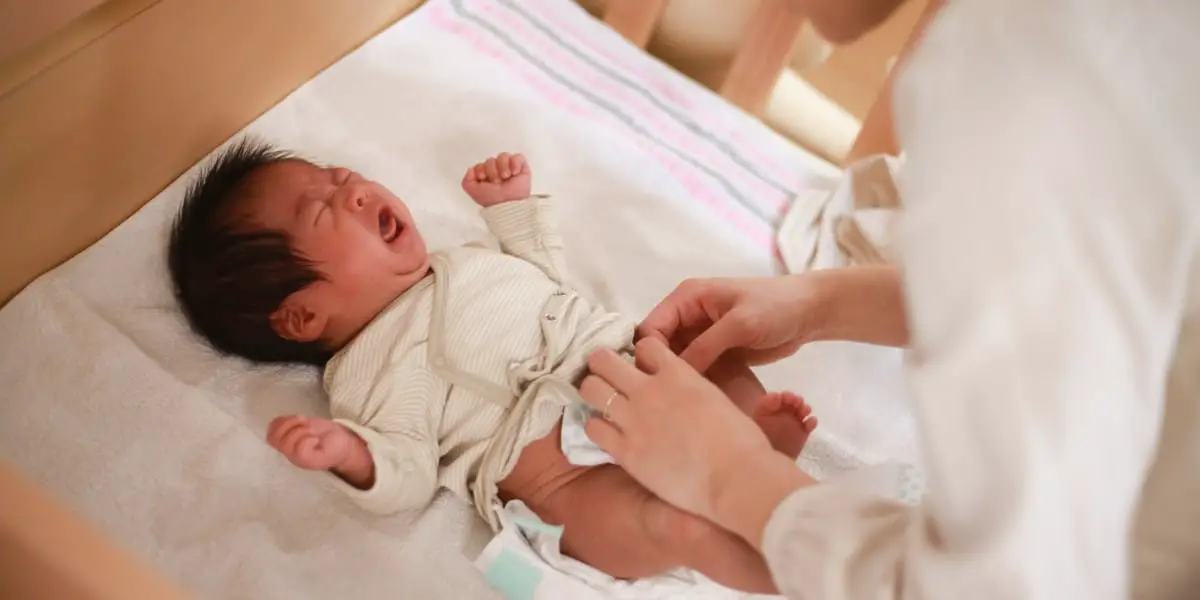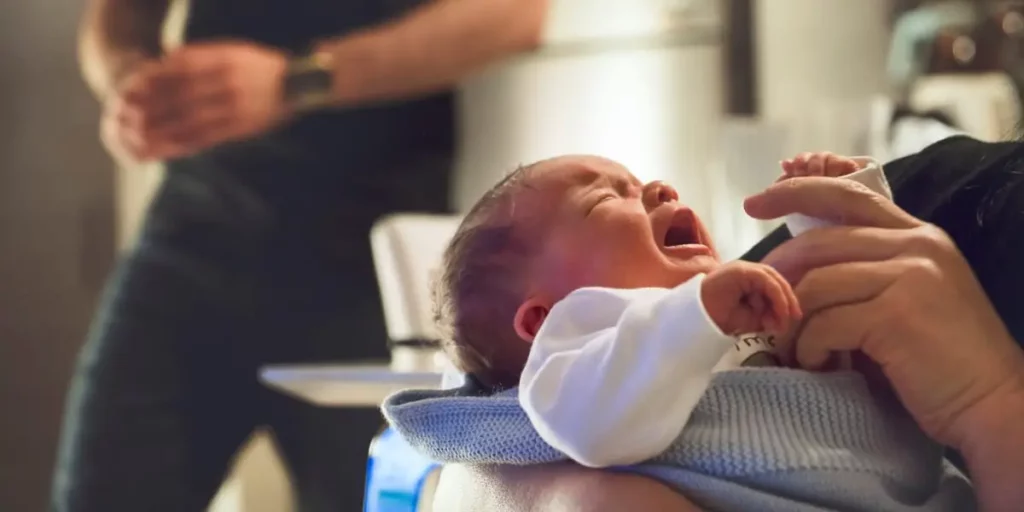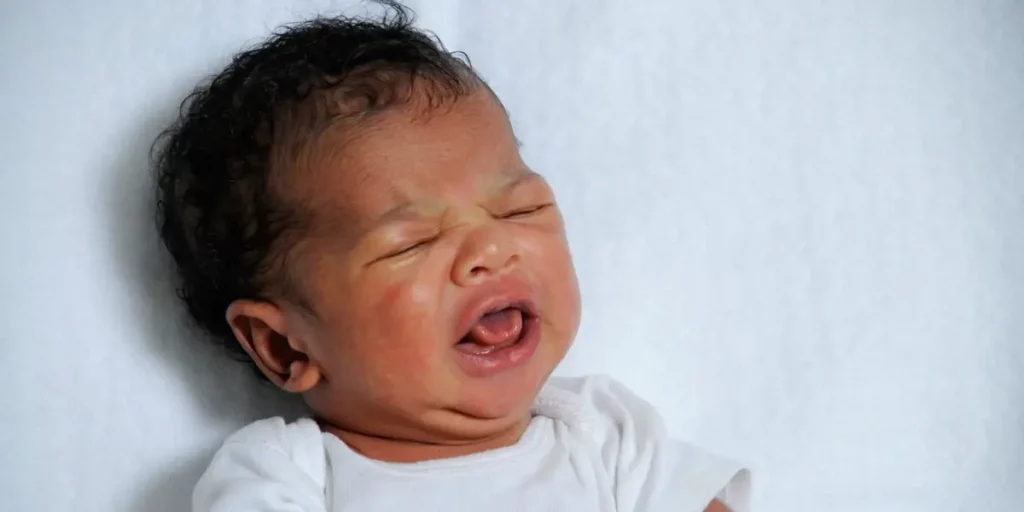
When a baby cries, it can be difficult to determine what is wrong. Are they hungry? Tired? Wet? It can also cause parents to be alarmed when baby cries when pooping.
In this article, we will explore one reason why babies cry when they poop – and that is because something is happening in their bodies!
We will discuss the digestive system of a baby, and explain why it can cause them discomfort when they poop. We hope this information helps you better understand your baby’s cries!
Help, My Baby Cries When Pooping
As parents, it can be really hard to figure out the meaning behind our babies’ behaviors. When they cry, it’s usually because they need something, but we might not always know what that is.
One common reason why babies cry is that they are constipated. Constipation happens when a baby’s stool (poop) is hard and dry, and they have difficulty passing it. This can cause baby discomfort and even pain.
When babies cry while pooping, it can be a sign that they are constipated. If you think your baby is constipated, talk to their pediatrician. They can give you some tips on how to help relieve your baby’s discomfort.
Below are other possible reasons why your baby might cry when pooping, as well as some tips on how to help:
Your baby has a food allergy or intolerance.
One of the reasons your baby might cry when pooping is if they have a food allergy or intolerance. Intolerance means that your baby’s digestive system is having difficulty breaking down certain foods.
Allergies occur when the body reacts to food as if it were harmful. Talk to their pediatrician if you think your baby might have a food allergy or intolerance. Healthy bowel movements are always the goal in these cases.
Your baby has an infection.
Another reason why your baby might cry when pooping is if they have an infection, such as a viral or bacterial infection. If you think your baby might have an infection, take them to the pediatrician. Infections are treated with antibiotics.

Signs of an infection include:
- Fever
- vomiting
- diarrhea
- not eating or drinking
A baby crying while not being able to pass stools is a different story. Babies tend to have soft stools. In case your baby, whether newborn babies or older ones, cannot poop, try rectal stimulation or exercising the abdominal muscles through tummy time to encourage healthy bowel movements.
Your baby has a blockage.
If your baby is having trouble passing stool, they might have a blockage. This can happen if the baby swallows too much of a foreign object, such as a coin or small toy.
If you think your baby might have a blockage, take them to the pediatrician right away. This is a serious condition that needs to be treated with surgery. You can usually tell that your baby has a blockage by their cry.
It will be a high-pitched, continuous cry that sounds like they are in pain. Take your baby to a children’s hospital immediately if this is the case.
Your baby has gas.
If your baby is gassy, they might need to pass some gas. You can help them by burping them after they eat and by using a baby carrier or swing to help comfort them. If you think your baby has gas, talk to your pediatrician.
They can give you some tips on how to help your baby feel better. Excess air will make most babies fussy and irritable. One of the indicators that your baby has gas is that their stomachs are hard to the touch.
Pooping can help relieve gas as pooping is usually accompanied by farting. Regular bowel movements are always good news to parents.
Your baby has a UTI (Urinary Tract Infection)
If your baby is crying and has a fever while pooping, it could be a sign of a UTI. Take them to the pediatrician right away for treatment.
Some reasons why a baby might develop a UTI are:
- Not being properly hydrated
- Having a blockage in the urinary tract
- Having a congenital abnormality in the urinary tract
Signs of a UTI include:
- Fever
- Crying while urinating or defecating
- Irritability
- Poor feeding
- Diarrhea
- Vomiting
If your baby has a UTI, they will need antibiotics. Make sure to give them the entire course of antibiotics, even if they start to feel better after a few days. Then, start to observe if your baby will still cry while pooping.

Your baby is constipated.
Constipation is one of the most common reasons why babies cry when pooping. If your baby is constipated, it means that they are having difficulty passing stool.
This can be caused by a number of things, including:
- Not getting enough fiber in their diet
- Not drinking enough fluids
- Eating too much dairy
If your baby is constipated, there are a few things you can do to help relieve their discomfort and prevent constipation in the future. Try giving them more water or prune juice to drink. However, if your baby is less than a year old, it’s better to skip the prune juice and just stick with water.
You can also try changing their diet to include more fruits and vegetables, and less dairy. High-fiber foods can also help if they no longer depend on formula feeding or breastfeeding. These foods will encourage a healthy bowel movement.
However, it’s important to be cautious when introducing new foods to your child. Constipation could be the least of your worries if your baby develops more serious health problems.
However, if you are dealing with a newborn, check with your pediatrician before giving them anything other than breast milk or formula.
If you think your baby is constipated, talk to your pediatrician. They may recommend a stool softener or laxative as the treatment for constipation. This will help improve your baby’s bowel movement.
Your baby is just uncomfortable.
There are also instances when your baby is pooping just fine, but a baby cries because it’s uncomfortable. This can be due to a number of reasons, such as teething pain or an ear infection.
If you think this might be the case, check with your pediatrician. They may be able to give you some tips on how to help relieve their discomfort. Make sure to take note of other symptoms of a medical problem or signs of pain in your child.
As parents, we all want our babies to stay healthy all the time.
How Can I Guarantee Healthy Bowel Movement For My Baby?
As mentioned above, healthy bowel movement for your baby is key to avoiding constipation and discomfort. So, how can you ensure this? Let us explore the ways below:
Encourage your baby to drink plenty of fluids throughout the day.
Babies are prone to dehydration. Therefore, it is essential to ensure they drink enough fluids. This will help soften their stools and make them easier to pass.
Make sure your baby is getting enough fiber in their diet.
Fiber helps add bulk to the stool, making it easier to pass. Good sources of fiber for babies include fruits, vegetables, and whole grains. However, always be careful about introducing new foods to your baby, as they may cause allergic reactions.
Encourage your baby to move their hips.
Hip movement helps loosen the stool and makes it easier for babies to pass. You can help your baby by moving their legs in a bicycling motion or by gently massaging their tummy in a clockwise direction.
Never force your baby to poop.
Forcing your baby to poop can be painful and may cause them to hold in their stool, which can lead to constipation. If your baby is having trouble pooping, make sure to talk to their doctor.

Tummy time is always a good exercise.
You should always put your baby on their tummy for a few minutes each day. Tummy time helps strengthen the muscles in your baby’s back and neck.
It also helps reduce the risk of developing flat spots on their head. Plus, when your baby’s abdominal muscles are strong, they’ll be able to better push out a stool.
How Often Should Babies Poop In A Day?
Babies usually poop after each feeding. Newborns may poop after every feeding, or they may skip a day or two. By the time they’re a few weeks old, most babies have slowed down to pooping once or twice a day. If your baby is older than six weeks and is not pooping regularly, talk to their doctor.
When Do Babies Start Pooping Less Often?
As your baby starts eating solid foods, they’ll poop less often. By the time they’re eating a variety of foods, they may only poop every few days. If this worries you, talk to their doctor. Some babies go a week or more without pooping and are perfectly healthy. However, it is always best to err on the side of caution and talk to their doctor if you have any concerns.
Why Does My Baby Turn Red When Pooping?
It’s not uncommon for babies to turn red in the face when they poop. This is because of the strain that they’re putting on their bodies. When your baby bears down to poop, they use the same muscles they use to breathe. So, it’s not surprising that this can cause them to turn red in the face.
If your baby is straining excessively or if they turn blue in the face, this may be a sign of a more serious problem and you should talk to their doctor.

Should I Give My Baby Water If They Are Having A Hard Time Pooping?
If your baby is having difficulty pooping, you may be tempted to give them water to help. However, it’s important to talk to their doctor before giving them any water. This is because giving your baby too much water can worsen their constipation.
If you are dealing with a newborn, water is just not a good idea. This is because their stomach is very small and they can quickly become dehydrated. If you are unsure whether or not you should give your baby water, talk to their doctor.
What's Normal for Baby's Poop?
Babies have different types of poop, depending on what they’re eating. Let us explore baby’s poop and what they mean below:
- If your baby is only breastfed, their poop will be yellow and seedy.
- If your baby is formula-fed, their poop will be tan and pasty.
- If your baby’s poop is green, it could mean that they are eating too many greens.
- If your baby’s poop is red, it could indicate an allergy or intolerance.
- If your baby’s poop is black, it could mean that they have ingested something harmful. If this occurs, seek medical help immediately.
When Should I Be Concerned About My Baby's Poop?
You should always consult with your baby’s pediatrician if you’re concerned about their poop. However, there are a few things to look out for that may warrant a call or a visit to the doctor:
- If your baby is constipated, they are having hard stools and having difficulty passing them. This can be painful for your baby and may cause them to cry when they poop.
- If your baby has diarrhea, this means that they are having watery stools. Diarrhea can lead to dehydration, so it’s essential to keep an eye on your baby if they have it.
- If you notice blood in your baby’s stool, this could be a sign of an infection or a more severe condition.
- If your baby is pooping less frequently than usual, this could be a sign of dehydration.
All of these things are worth mentioning to your baby’s doctor. They will be able to help you figure out what’s going on and how to treat it.
Conclusion
So, why do babies cry when they poop? There could be a few reasons. If you’re concerned, it’s always best to talk to your baby’s doctor. They will be able to help you figure out what’s going on and how to treat it.
The next time your baby cries when pooping, make sure to remember the things discussed here. For your part, you must be patient and understand that this, too, shall pass. Baby poop is a natural and necessary part of their development.
Eventually, they will figure out how to do it without making such a fuss. Until then, try your best to keep them comfortable and let them know that you’re there for them.


Leave a Reply